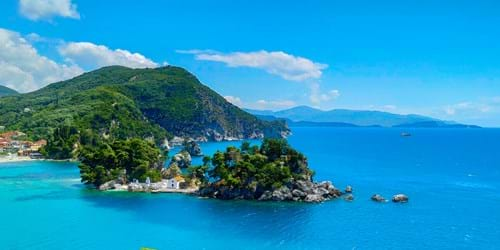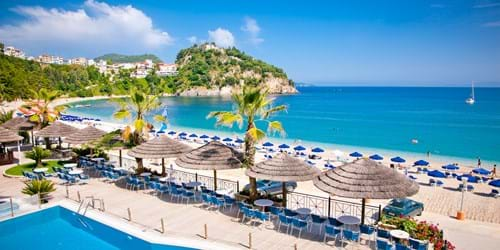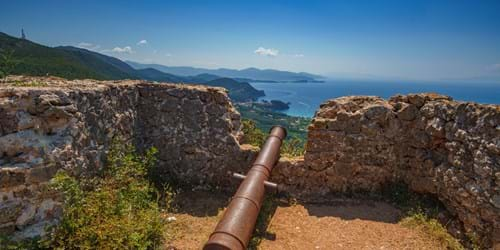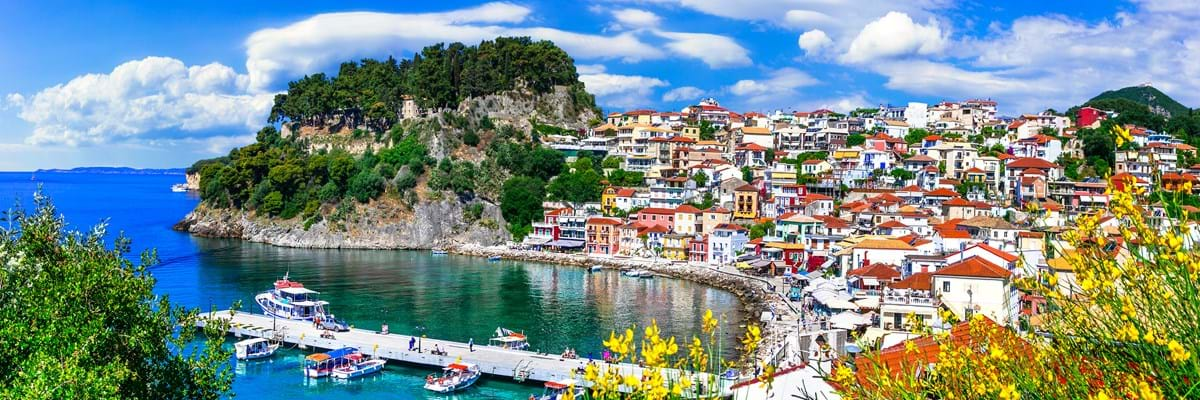There is a chance that, in those first few moments – and perhaps in the first few miles after you have pulled away from Preveza Airport in search of Parga – you will labour under the impression that you have chosen the wrong road. You may well check the details you have tapped into the sat-nav. You may reach for an old-fashioned map, and scan its printed paper for clues. You may find yourself asking: Is this really the right way?
Your concern could be down to the realisation that quite a few people on your flight have taken a different path – over the bridge to the Ionian island of Lefkada, on whose doorstep the Preveza air-strip sits. Maybe it will be due to the knowledge that, had you flown on for another 20 minutes, you would have been touching down on Kefalonia, and known exactly where you were. Or perhaps the spark of your uncertainty will be the way the landscape falls so swiftly back into calm and quiet, pretending that it has never heard of passengers and planes – revelling instead in that version of the Greek countryside that looks as if it has gone unchanged since the Gods of Olympus ruled this realm. Mountains on the right-hand side of the highway, their ridges merging with the blue of the sky. The sea sparkling silver away to the left. Fir trees – and the fragrance they carry – crammed into the corners. The burblings of a million crickets, somewhere deep in the undergrowth.

Your scepticism will probably stay with you for the whole 40 miles of the drive, past the villages of Kanali and Kastrosikia, Kato Riza and Ammoudia. Are you sure we're going in the correct direction? Should we turn around? There doesn't seem to be that much here.
Stick at it. Keep your hands on the wheel. Battle your doubts. You are exactly where you should be. And before long, another key element of the Greek landscape will reveal itself.
As soon as you see it, Parga is both instantly recognisable and completely unknown. On one hand, it is that familiar friend of Greek holidays; the little town on the waterside, spilling down its hillside in a scree of orange-roofed houses, white-walled box churches and seaside comings and goings – fishing boats inching away from port, waves slapping at the dock. On the other, it is still something of a travel secret. Which is remarkable. In a country so loved by European visitors – where the likes of Corfu, Zante, Crete, Santorini, Mykonos and Rhodes are holiday hotspots every summer – it is an outsider, hidden beyond the popular gaze. It is an example of something you have undoubtedly already seen elsewhere in Greece. But then, for all that, relatively few have seen it, or relished its company.
In large part, this is down to its location – high up on the north-west edge of the Greek mainland, in the less-promoted Epirus region. In its semi-isolation, it is much closer to Albania than it is to Athens. And yet, any idea that Parga is some dull outpost is dispelled the moment you reach it – and not just because nearby Corfu frames some of the horizon, staring at the same sunset. Here is a town that is as lively (yet laid-back) as anywhere else in this Mediterranean nation – whether it be in the seafront restaurants, pizzerias and traditional tavernas set out along the waterfront promenades of Grigoriou Lampraki and Anevxavrtisias, or the beaches which lay down arcs of sand and stone on either side of the centre. These are particularly special. Valtos Beach is one of those broad curves of shore that, though rarely empty, offers so much room that it never feels crowded. Krioneri Beach is smaller, but offsets its size with gorgeous views of the islet of Panagia in the bay beyond – where a tiny chapel provides a photographic backdrop for the energetic souls who swim the few safe metres of sheltered shallows to admire it. Lichnos Beach is a further delight, a touch to the east, with a range of villas and apartments directly above it.

There is history too. Up on its crag opposite Valtos Beach, Parga Castle is a dramatic ruined relic of the 15th century – a remnant of the time when the Venetians controlled this stretch of the Ionian. Four miles away, on a bluff of its own, the Ali Pasha Castle is a rival citadel – a tumbledown reminder that the Ottoman Empire also swept through this region.
It is worth taking a drive up to this fractured fortress, where grass grows under medieval arches, and flowers peep through ramparts that once bristled with cannons. But there is scant need to venture much further. There is a simple joy to wandering in the labyrinth of streets which shapes much of Parga, forcing your legs up the steep gradient, past family homes with their doors open in the summer heat, into small craft stores and shops brimming with local products – herbs wedged into jars; olive oils gleaming in tall bottles.

Greece is a favourite country for many, supplying amazing holidays time and time again. Parga’s gentle ambience draws you in, allowing you to create memories from the moment you arrive. Breakfasts of fresh orange juice, warm pastries and coffee at the Green Bakery; swordfish steaks at Taverna Arkoudas on the harbour. It is not a town that seeks to thrill – the late nights of Malia or Mykonos won’t be found here. But if you are hoping for that slow, serene sort of Greece – and an edition of it that has not yet been fully discovered – Parga will certainly meet your expectations.




